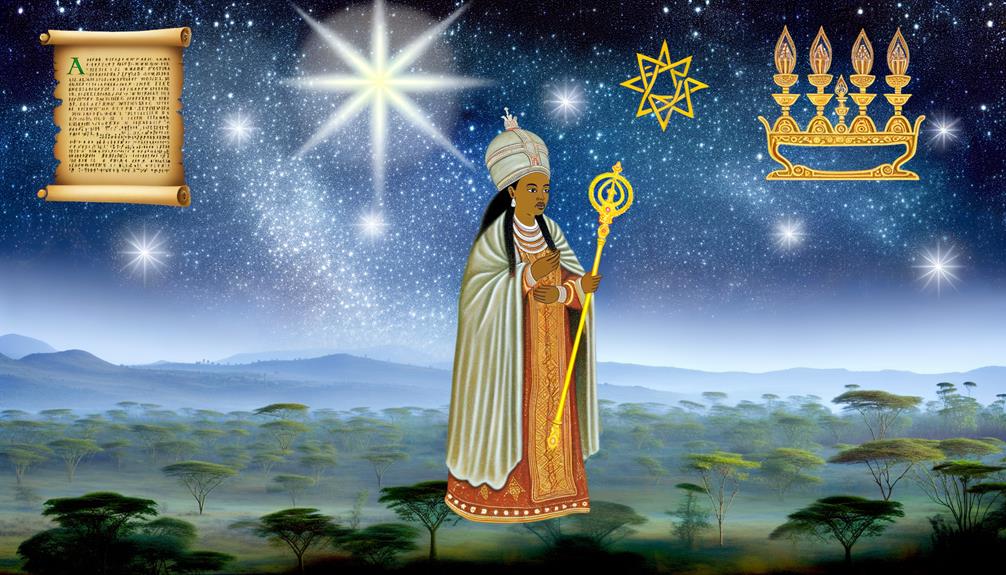Biblical Meaning of the Name Candace
The name Candace, referenced in Acts 8:27, originates from the ancient title 'Kandake,' indicating queen mothers of the Kingdom of Kush. This term highlights the influential matriarchal leadership of these African rulers.
The New Covenant narrative involves an Ethiopian eunuch serving under Queen Candace, illustrating the early Christian message's inclusivity and its reach beyond Jewish communities. This encounter emphasizes the divine orchestration in spreading Christianity and underscores the influence of powerful female leaders.
The theological and historical implications of Candace invite further exploration into the early expansion of the Gospel and the intersection of African political power and Christianity.

Key Takeaways
- Candace originates from the ancient title 'Kandake' used for female rulers in the Kingdom of Kush.
- Acts 8:27 highlights Queen Candace's role in the spread of early Christianity through her Ethiopian eunuch.
- The name symbolizes divine inclusivity and the expansion of the Gospel beyond Jewish boundaries.
- Candace represents strong, divinely-appointed female leadership in biblical and historical contexts.
- The name reflects the intersection of African political power and early Christian teachings.
Origin of the Name
The name Candace, derived from the ancient title 'Kandake,' historically referred to the female rulers or queen mothers of the Kingdom of Kush, as evidenced in biblical passages such as Acts 8:27.
The Kingdom of Kush, located south of Egypt, was renowned for its powerful matriarchal leadership, with 'Kandake' being a hereditary title. This title underscored the influential role women played in Kushite governance and culture.
In the Greco-Roman world, the term evolved into 'Candace,' maintaining its regal connotation. Theologically, the name's inclusion in scripture underscores the global reach of early Christianity and highlights the diverse figures who interacted with the faith.
This historical context enriches our understanding of the name Candace and its profound biblical significance.
The New Testament Reference
Acts 8:27 provides a pivotal New Covenant reference to the name Candace, highlighting the encounter between Philip and an Ethiopian eunuch serving under the queen. In this passage, the eunuch is described as a high-ranking official responsible for all the treasures of Candace, the queen of the Ethiopians. This interaction underscores the reach of early Christian evangelism and the inclusivity of the Gospel.
Philip's divine guidance to this Ethiopian official, who was returning from worship in Jerusalem and reading Isaiah, points to the fulfillment of the prophecy and the spread of Christianity beyond Jewish boundaries. The name Candace, hence, signifies not just a title, but a bridge in God's redemptive plan extending to the ends of the earth.
The Role of Ethiopian Queens
Understanding the significant role of Ethiopian queens, particularly those bearing the title Candace, sheds light on the historical and theological implications of their leadership during the early Christian era. Ethiopian queens, often referred to as Candace in historical texts, wielded considerable political and religious influence.
This is evident in Acts 8:27, where the Ethiopian eunuch, a high official under Queen Candace, encounters Philip. The queen's authority in governance and her court's openness to diverse beliefs reflect a society where powerful women shaped religious and cultural landscapes.
Candace's role underscores the intersection of African political power and early Christianity, highlighting the queen's pivotal part in the dissemination and reception of Christian teachings within her domain.
Kandake: Title and Meaning
The title 'Kandake' historically referred to the reigning queens of the ancient Kingdom of Kush, an area that includes present-day Sudan and parts of Ethiopia.
The significance of this title is highlighted in Acts 8:27, where the Ethiopian eunuch serves under Queen Candace, underscoring the political and spiritual authority these queens wielded.
Ethiopian Queen's Title
In ancient Ethiopia, the title 'Kandake' or 'Candace' was used to denote powerful queens who ruled the kingdom, as illustrated in Acts 8:27 where a eunuch serves under such a queen.
This title was not merely a personal name but a dynastic title for queens in the Kingdom of Kush. Theologically, it signifies the divinely sanctioned authority and revered status held by these queens, who were often seen as warriors and protectors of their domain.
Scripturally, the reference to a Kandake queen underscores the reach of the early Christian message, as the Ethiopian eunuch's encounter with Philip ultimately leads to his conversion and baptism, suggesting a divine inclusivity extending even to the African monarchies.
Historical Significance Explained
Kandake, derived from the Meroitic word for queen, signifies a sovereign female ruler in the ancient Kingdom of Kush, embodying both political power and divine authority.
Historically, the title 'Kandake' was not merely a ceremonial designation but denoted a queen who wielded substantial influence, often governing in her own right or alongside a king. These queens were revered, perceived as semi-divine figures, and integral to the religious and administrative life of the kingdom.
Scriptural references, such as Acts 8:27, underscore the prominence of Kandakes in the biblical narrative, illustrating their critical role in regional politics and trade.
The Kandake's authority was recognized and respected, reflecting the unique matriarchal elements within Kushite society.
Biblical References Analyzed
Scriptural accounts, particularly in Acts 8:27, shed light on the significance of the title 'Kandake' by narrating the encounter between Philip and the Ethiopian eunuch, a high-ranking official serving under the queen of the Ethiopians.
The term 'Kandake' is historically understood as a title rather than a personal name, denoting the queen mother of the Nubian kingdom of Meroë. This title signifies matriarchal authority and governance, highlighting the cultural and political structure of ancient Ethiopia.
Theologically, the eunuch's interaction with Philip underscores the inclusivity of the Christian message, transcending ethnic and social boundaries. This encounter illustrates the early church's mission to spread the gospel universally, as exemplified by the Ethiopian's subsequent baptism and conversion.
Cultural Interchange in Antiquity
The name Candace, deriving from the title 'Kandake' used by the queens of ancient Nubia, exemplifies the rich cultural interchange between African civilizations and other regions during antiquity.
This title's presence in the Book of Acts (8:27-39) underscores the interconnectedness of disparate cultures. As Philip encounters the Ethiopian eunuch, the narrative reveals a profound theological dialogue that transcends geographical boundaries.
Nubia, known for its wealth and advanced society, engaged in trade and intellectual exchange with neighboring Egypt and beyond. Such interactions facilitated the spread of ideas, religious practices, and linguistic influences.
The biblical mention of Candace not only highlights her political stature but also reflects the divine orchestration in bringing diverse peoples into the fold of early Christian teachings.
Spiritual Symbolism
The convergence of historical and theological narratives in the figure of Candace provides an entry point into understanding her profound spiritual symbolism in the biblical context. Mentioned in Acts 8:27, Candace, Queen of the Ethiopians, signifies divine authority and the global reach of God's message.
Her role in the conversion of the Ethiopian eunuch underscores the inclusivity of the Gospel, transcending ethnic and geographical boundaries. The name Candace, derived from the Kushite title for queens, symbolizes leadership imbued with divine favor and wisdom.
This convergence highlights the universality of salvation and the breaking down of barriers, reflecting Isaiah's prophecy (Isaiah 56:3-8) of a house of prayer for all nations. Therefore, Candace embodies the spiritual expansiveness of Christian doctrine.
Legacy in Christian Traditions
The legacy of the name Candace in Christian traditions is rooted in its historical significance, as seen in Acts 8:27 where a queen of Ethiopia bears the name, symbolizing divine authority and wisdom. This scriptural reference enriches its theological depth, portraying Candace as a figure of profound influence and spiritual leadership.
In addition, her legacy continues to inspire modern faith communities, illustrating the enduring impact of biblical names and narratives on contemporary Christian practice.
Historical Significance Explained
Rich with theological significance, the name Candace holds a unique position in Christian traditions, often linked to the Ethiopian queen mentioned in the Acts of the Apostles.
In Acts 8:27, Philip meets an Ethiopian eunuch, a high-ranking official under Queen Candace, in charge of all her finances. This story establishes Candace's historical importance, symbolizing a connection between early Christianity and Africa.
The title 'Candace' was indeed a hereditary title for Ethiopian queens, showcasing their political and spiritual power. This relationship highlights the inclusive essence of the Christian message, surpassing geographical and cultural boundaries.
The legacy of Candace serves as a proof of the universal reach of the Gospel, emphasizing its acceptance of various peoples and nations.
Symbolism in Scripture
Among the myriad of biblical names, Candace stands out as a powerful symbol of divine providence and intercultural unity within Christian traditions.
The name Candace, referenced in Acts 8:27, is associated with the Ethiopian queen whose treasurer encountered Philip the Evangelist. This encounter encapsulates rich symbolism:
Divine Guidance: The Holy Spirit directed Philip to the Ethiopian eunuch, symbolizing God's providential role in spreading the Gospel (Acts 8:29).
Inclusivity: It signifies the breaking of ethnic and cultural barriers, as the Gospel reached Africa through the Ethiopian official.
Legacy of Faith: The eunuch's baptism represents the early expansion of Christianity beyond Jewish communities, highlighting God's universal call.
Influence on Modern Faith
In contemporary Christian traditions, the heritage of the name Candace continues to inspire believers, symbolizing the early Church's commitment to transcending cultural and ethnic divisions in the spread of the Gospel. The Ethiopian eunuch's conversion in Acts 8:27-39, under the reign of Candace, Queen of the Ethiopians, highlights the inclusivity of the Christian message.
This event signifies the breaking of barriers, as Philip preached to someone outside the Jewish community, fulfilling Jesus' mandate in Matthew 28:19 to 'make disciples of all nations.' Modern faith communities look to Candace's story as a proof to the universal reach of Christianity, encouraging inclusivity and the embracing of diversity, which remains a cornerstone of Christian mission and evangelism today.
Modern Interpretations
Modern interpretations of the name Candace often explore its cultural evolution and theological significance within contemporary Christian communities. Reflecting on its biblical roots, scholars and believers alike draw meaning from its mention in Acts 8:27, where Candace is a title for the queen of the Ethiopians. This reference invites modern applications, emphasizing leadership, faith, and divine purpose.
To provide a thorough understanding, consider the following interpretations:
- Leadership and Authority: Candace symbolizes strong, divinely-appointed female leadership, reflecting historical queenship.
- Faith and Devotion: The Ethiopian queen's servant's baptism by Philip signifies the spread of Christianity beyond Jewish borders.
- Cultural Legacy: Today, the name is a reminder of Christianity's early, inclusive reach into Africa, promoting unity and diversity within the faith.
Conclusion
The name Candace, derived from the ancient title 'Kandake,' signified Ethiopian queens and appears in the New Scripture in reference to a royal figure (Acts 8:27).
Reflecting the rich interplay between African and biblical histories, Candace symbolizes leadership and spiritual authority.
Significantly, Ethiopia's conversion to Christianity in the 4th century AD underscores this legacy, with over 60% of Ethiopians identifying as Christian today, highlighting the enduring impact of such historical and theological intersections.






